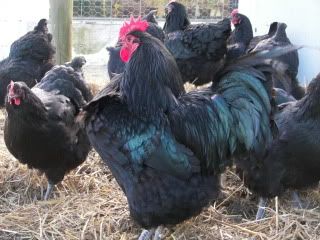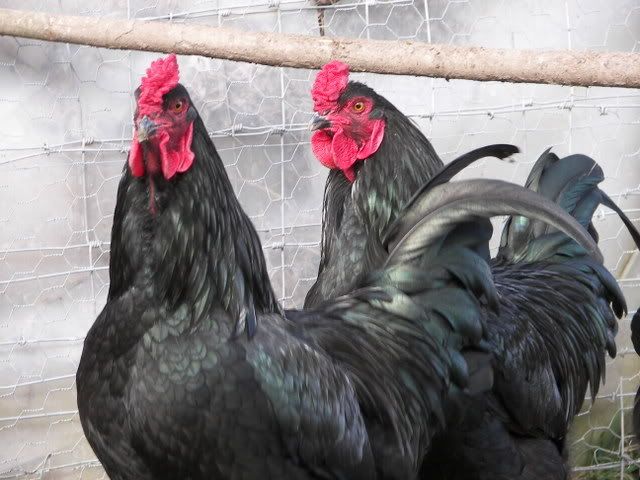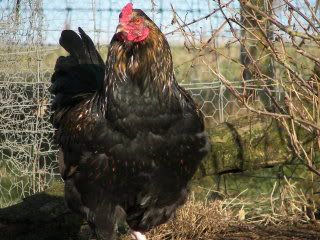I breed utility breeds which means the birds utilize the feed given in egg or meat production.
When I started keeping birds in the early 60's there were breeds around then that were used for table and eggs, namely Rhode Island Red,Light or White Sussex,Plymouth rock and the farmers favorite cross a Rhode Island Red cock on a Light Sussex hen.
The resulting chicks from a RIR X LS were sexable at hatch and the cocks were usually culled or reared on seperately to the young pullets for the table.
We have become accustomed to seeing big breasted meat breeds in supermarkets, but before the early 60's only a few were available to farmers as breeding just for meat was thought inpractical.
Back then cockerels were sold at around 12-16 weeks and they weighed about 2-3 lb max as spring chicken.At the other end of the scale birds that had been caponised were reaching around 8lbs and were a luxury item.Over 12 months and up there were stags and they were boilers as were 'spent' hens.
Nowadays you will not get a light Sussex worth running on because practically all the really good strains have been lost.Same goes for RIR.There may be a few New Hampshire Reds about but very difficult to find.
These breeds have been lost through bad breeding practices and exhibition breeders.
Indian Game crosses.
These are your only option if your looking for a decent Jordon (a bird with a big breast) and that needs thinking through before you start.
Indian Game don't lay loads of eggs like other pure heavy breeds,so your looking about 120-150 eggs a year if you can stop them going broody.
The cross needs to be to a good heavyweight layer.
Nearly all the heavy breeds now..RIR,LS Plymouth Rock are much poorer layers, down to breeding for colour and feathers..not egg numbers.So you need a good strain or you will end up with mediocer birds and waste time and money...Whatever breed you choose unless it's a commercial tablebird your looking at 6 months before it's big enough.
I have tried them all in my time and the best by far is an Australorp Cock on Indian Game hens.
Australorps hold the unbeaten world egg laying record of 364 eggs in 365 days.(Australian Goverment trials).They are big birds (Adult cock about 12lbs) and calm and placid.

Mated to Indian Game you get these.

Welsh Black Fowl. These dress out at 6 months around 7lbs and the pullets will lay 280-300 eggs a year for at least 4 years.
Mated brother to sister you get these. (Welsh Black x Welsh Black).

and mating the cock back to Indian Game you get.
Improved Indian Game.
These lay even better than than pure Indians and are half as big again.
You simply choose the biggest cockerel and eat the other males.The pullets will lay loads of eggs,sit and rear your next generation.
More info on my Web page
www.castlefarmeggs.co.uk